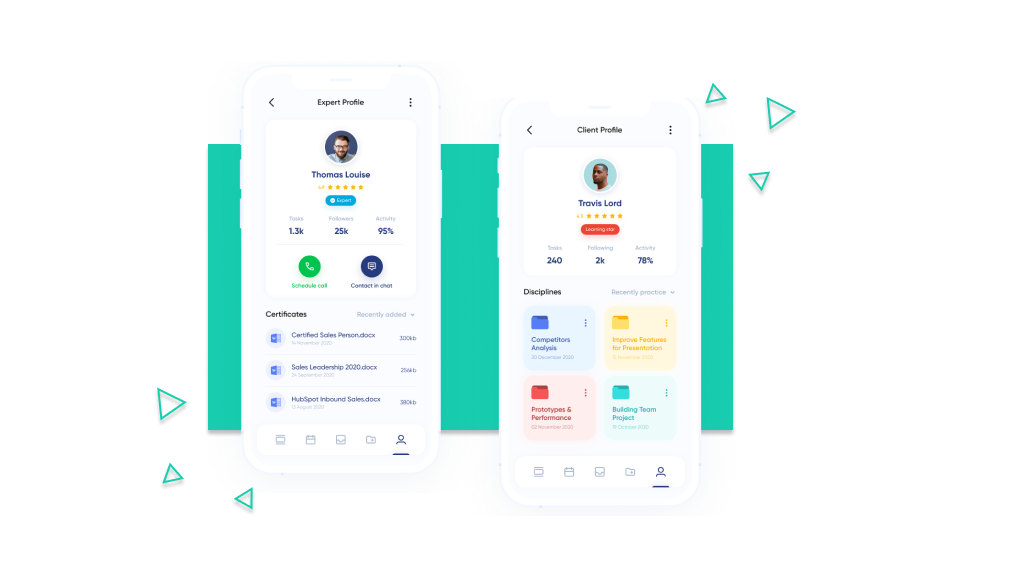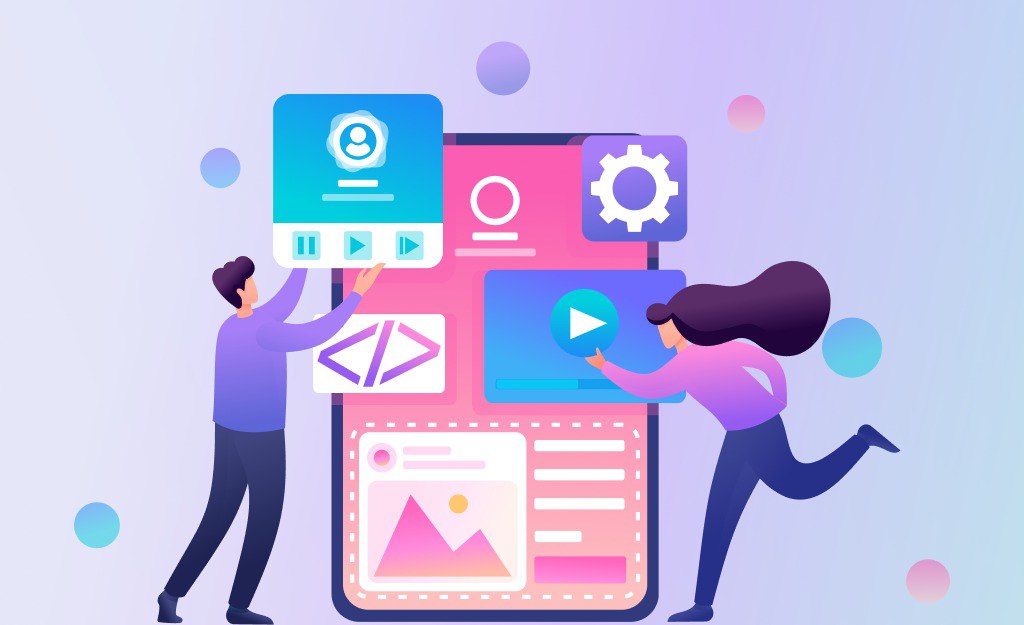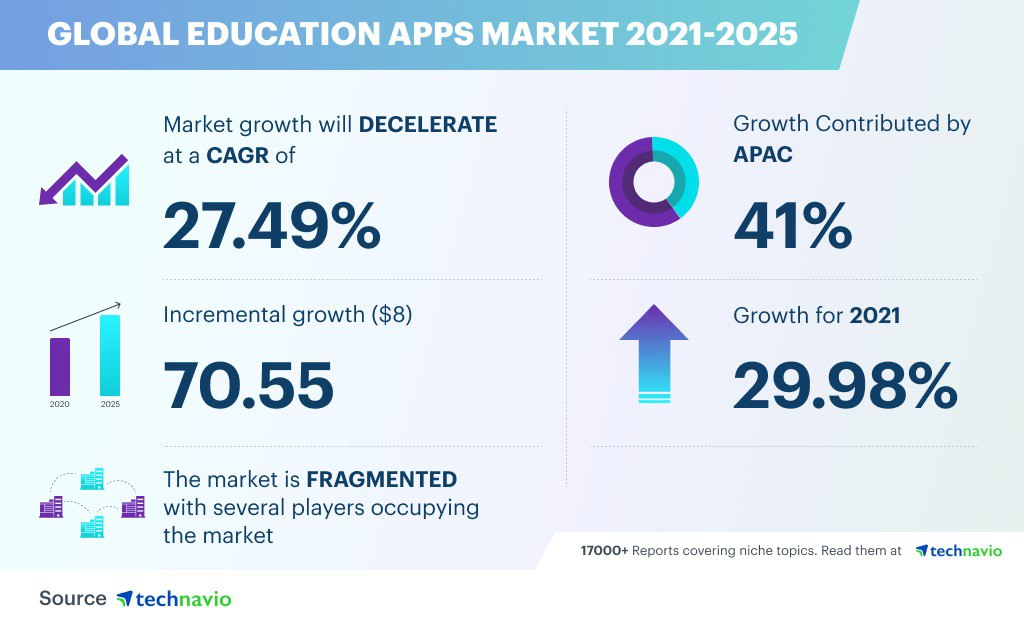
E-learning platform development: why embrace e-learning in your organization
The e-learning industry is expanding rapidly over the world. According to a recent report, the e-learning market is expected to reach $457.8 billion by 2026, growing at a compound annual growth rate (CAGR) of 7.5%.
This growth is being driven by a number of factors, including the expanding availability of high-speed Internet connections, the rising popularity of online learning platforms, and the increasing usage of mobile devices.
Aside from that, as a part of an edtech industry, the e-learning market is expected to be fueled by continued growth in the corporate sector, as companies increasingly use e-learning for employee training and development.
Today, there are a variety of e-learning platforms available, each with its own unique features and capabilities. Some of the most popular include Coursera, Udemy, and Skillshare. These platforms offer a wide range of courses, from programming to business and design.
In this article, we will go over some critical aspects of building an e-learning platform and use one of our online education projects as an illustration of what can be accomplished in this area.
Contents:
- Types of e-learning platforms
- How to start creating an online learning platform?
- Benefits of custom e-learning platform development
- Our expertise: edtech marketplace development
- Signs your organization needs an e-learning platform
- Challenges in the development of e-learning platform
- Cost of e-learning development
- Conclusion: leveraging e-learning development services

Types of e-learning platforms
E-learning platforms are web-based applications that allow users to access and interact with learning content and materials.
There are numerous types of e-learning platforms available. Some are designed for use in corporate training programs, while others are more general and can be used for a variety of purposes. Here are a few of the most common types of online learning platforms:
1. Learning Management Systems (LMS): These platforms are designed specifically for managing and delivering online learning programs. They typically include features like course creation and management tools, user tracking and reporting, and integration with other HR systems.
2. Virtual Classroom Software: Such platforms provide a virtual space for instructors and students to interact and collaborate. They often include features like video conferencing, chat, and whiteboard tools.
3. Collaborative Learning Platforms: These kinds of platforms are designed to facilitate collaboration and interaction between learners. They typically include features like forums, chat, and wikis.
4. Social Learning Platforms: These platforms use social media features to facilitate learning. They often include features like blogs, discussion forums, and user-generated content.
5. Content Management Systems (CMS): This type of platform is designed for creating and managing digital learning content. They typically include features like content authoring tools, content management tools, and integration with other learning platforms.
Choosing the right e-learning platform for your needs depends on a number of factors, including the type of learning content you want to deliver, the level of interactivity you require, and your budget.
How to start creating an online learning platform?
As organizations increasingly look to adopt online learning solutions, they are turning to e-learning outsourcing development to help them save time and money. By partnering with an experienced e-learning development company, organizations can get their solutions up and running quickly and efficiently.
When selecting an e-learning development partner, it is important to choose a company with a proven track record in delivering quality edtech solutions. The company should also have a robust development process so that you can be confident that your product will be delivered on time and on budget.
At Jellyfish.tech, we provide e-learning software development services, which are backed up by our successful cases.

👉 Contact us to get a free consultation
Overall, the development of e-learning platforms is a complex process, involving the creation of digital content, the design and construction of the platform itself, and the integration of various technologies. However, the rewards of building a successful e-learning platform are well worth the effort — well-designed software can provide learners with a rich and engaging learning experience and can give educators a powerful tool for delivering their courses.
When creating an e-learning platform, there are several factors to consider.
The first step is to identify the users’ needs and requirements. What information do they require? What features and tools must they be able to use? What level of interactivity and engagement are they looking for?
Once the users’ needs have been identified, the next step is to choose the appropriate technology.
The third step is to develop the platform. This includes designing the interface, creating the content, and testing the platform to ensure that it is user-friendly and functional.
After the platform has been established, it is crucial to promote it to users. Social media, word-of-mouth marketing, and communications efforts can all be used to achieve this.
Therefore, by identifying the needs of the users and selecting the right technology, businesses and educational institutions can greatly leverage e-learning web development and achieve their strategic goals.
Benefits of custom e-learning platform development
Custom e-learning development can be a challenge, but it can also be a very rewarding experience. Today, it has almost become a must for businesses: for instance, more than 40% of Fortune 500 companies regularly and extensively use e-learning.
The process of custom e-learning development involves creating a learning program that is tailored to the specific needs of a particular organization or individual. This process typically begins with a needs assessment, which is used to identify the specific learning goals and objectives that need to be addressed.
Once these goals and objectives have been identified, a custom online learning solution can be designed and developed. This solution can include a variety of different elements, such as instructional content, assessment tools, and learning activities.
Jellyfish.tech offers a free consultation with our edtech development team that can assist you in determining the best way to develop and deliver your content, and how to integrate it with your existing learning management system. Our team has extensive experience in designing and developing e-learning platforms and can advise you on the latest trends and technologies.

Whatever your reasons, an e-learning website can be a great way to achieve your business goals.
Some benefits of an online learning platform include:
Reaching a global audience
Thanks to the internet, organizations can reach a global audience with their e-learning platforms. In fact, many businesses are taking advantage of this opportunity by creating online training that is accessible anywhere in the world. The ability of companies to offer online learning programs has made it easier for employees to learn new skills or improve existing ones without having to leave their home office. This is especially important for companies that want their teams to be able to collaborate effectively while they are working remotely.
In general, custom e-learning development is a great way to promote your product or service to a wider audience, and it can also help you to build a more diverse customer base.
Providing a more flexible learning environment
First of all, e-learning can be used to train employees and make sure they are ready for new positions and tasks. It also allows your employees to access information from anywhere and anytime without having to stop working.
Typically, an e-learning website gives you the ability to offer a wide range of courses and learning materials, which can be tailored to the needs of your audience. The platform also allows learners to track their progress and ensure that they are receiving the best possible education. This way, online learning increases employee engagement because it provides them with greater control over their learning experience than they would have in a traditional classroom setting.
Cutting business expenses
E-learning web development can save you on costs associated with traditional classroom instruction, such as renting space, buying materials, and hiring instructors.
Expenses can also be reduced by using e-learning software for all aspects of training, including onboarding new hires, training current employees, and providing ongoing training for employees who need to keep up with changes in their jobs. Employees will also appreciate having access to their company’s learning resources at any time, making it easier for them to learn new skills and stay current on changes within the company or industry they work in.
Besides this, 42% of organizations report that e-learning has significantly increased their revenue.
Achieving a strategic advantage
72% of worldwide organizations believe that e-learning gives them a competitive advantage in their business, or could potentially give them a competitive advantage in the future.
E-learning is a tool that can be used to help organizations get an edge in the market. When it comes to implementing online learning options, this means that the organization will be able to provide their employees with a better quality of education and training, which in turn will allow them to become more productive and efficient.
This is especially true when an organization’s goal is to provide its employees with the most up-to-date information on a particular subject or industry. E-learning allows for this because it offers the ability for employees to learn at their own pace, which can help them stay focused on what they need to learn instead of trying to cram everything into one sitting.
Our expertise: edtech marketplace development
The Jellyfish.tech team has worked on an online education project which has risen in popularity during the pandemic. The team has done several pieces of research in the e-learning industry, guided by the best UX practices.
The delivered platform connects learners and experts in a single environment. The end goal is to enable these experts to make money by chatting with people and helping them solve problems using their expert knowledge and advice. This is a great way for people to monetize their skills and experience, and it also provides a valuable service to those who need help with specific issues. The platform is easy to use and provides a great service for both experts and those who need their expertise.
If you have an idea for an edtech project, Jellyfish.tech can assist you in idea validation & project estimation.
Here are some features that our edtech application has:
Verification system
Obtaining an expert status is impossible without uploading education certificates and undergoing verification to demonstrate credibility.
The support team manually verifies each user who claims to be an expert, reviewing their certificate(s) and work experience to confirm their status. As a result, students can be confident that they are communicating only with experts.
Internal messaging with a built-in billing
To purchase credits ($1 equals one credit) for expert consultations via chat or video calls, a student makes a deposit.
This system’s usage of WebSockets technology enables users to receive notifications of new chat messages, chat requests, video call confirmations, etc. pretty promptly.
Video calls
Chat with an expert allows video calling and the option to share the screen, in the case that a student needs in-depth assistance.
We’ve implemented the video to text convert tool for the convenience of both experts and students alike: your video conference speech can be automatically converted to text.
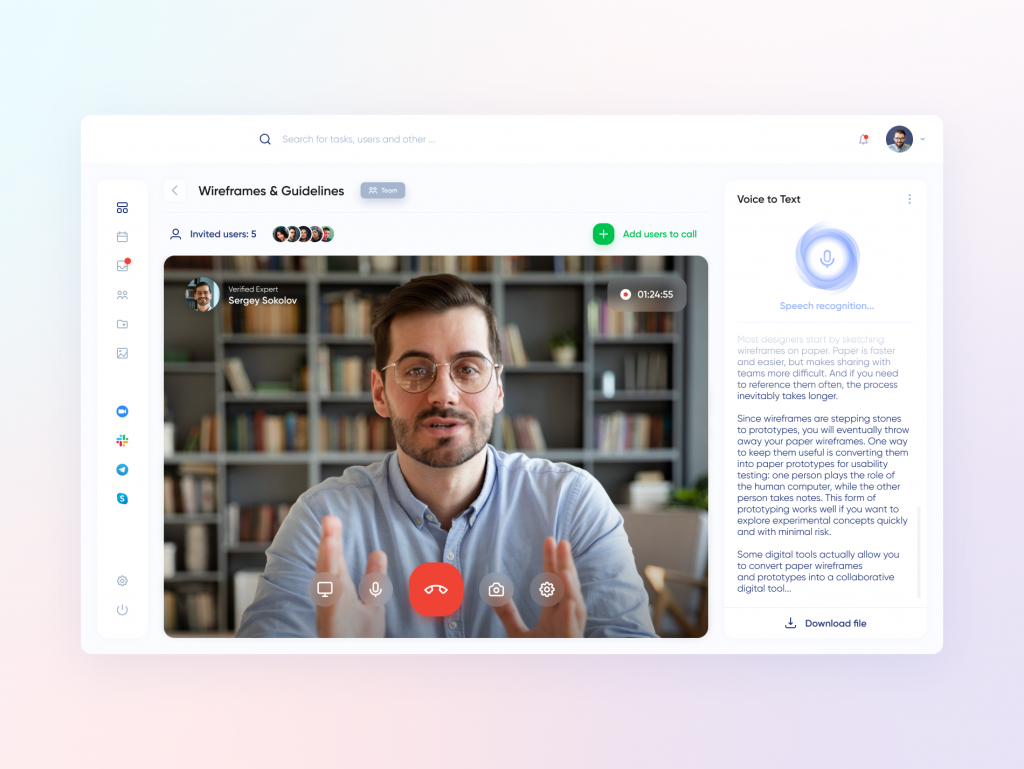
Chatbot
A chatbot could supplement or perhaps fully replace a human onboarding a new user by explaining the features and functionality of the system and how to use them. With the help of chatbots, pop-ups, and tooltips, your employees will be able to spend less time on mundane tasks like onboarding a new employee and more time on strategic initiatives.
Knowledge base
We have made the structure of our knowledge base similar to the wiki functionality found on Wikipedia. Users can easily navigate through the platform to find answers to frequently asked questions, check out terms and conditions, and learn more about our company and products. This wiki-inspired structure makes it easy for users to find the information they need when they need it.
Integrations
Today’s applications do not operate in a vacuum; to provide the optimal user experience, we must create integrations with the daily services our clients utilize.
Following a brief discussion, we’ve chosen to integrate with:
- Online calendars (Google, Calendly) to provide the ability to schedule calls, chats, make reminders, select the due date for tasks, etc.
- Online storage (Google, Dropbox).
- Social networks (LinkedIn, Facebook) to facilitate social sharing.
Real-time statistics dashboard
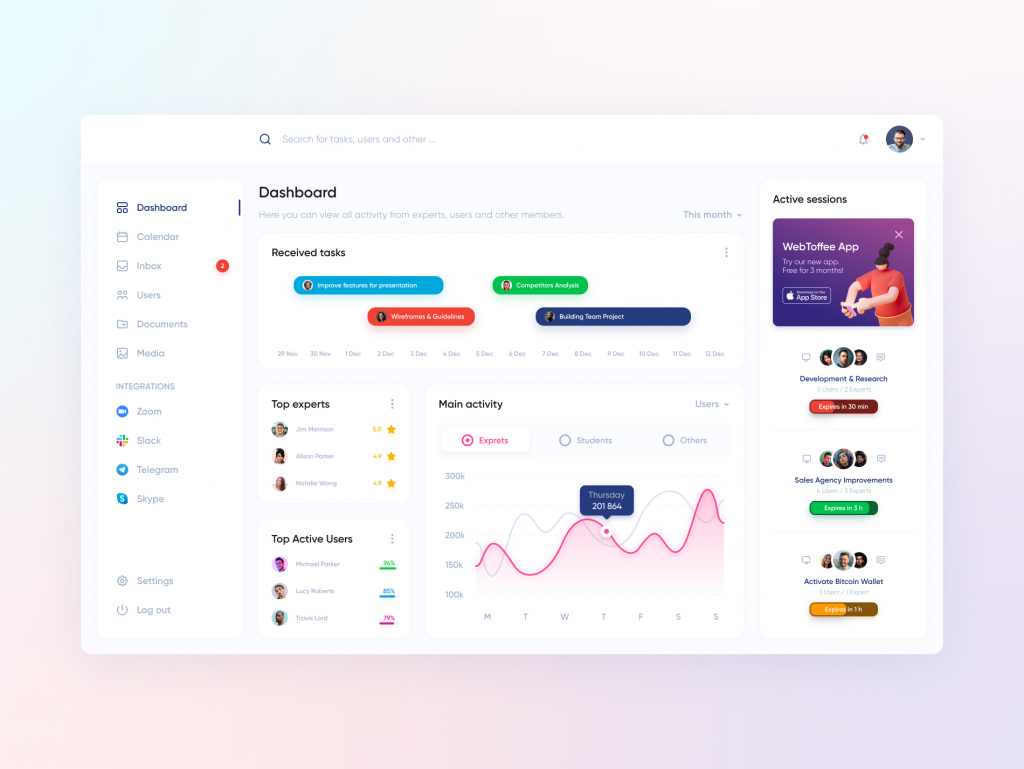
Jellyfish.tech’s development team built a real-time dashboard with graphs and charts to display the platform’s user base’s quantitative data.
The dashboard is used to monitor things like the number of experts online, their ratings, the percentage of successful students, the most popular courses, and so on. The statistics dashboard was developed using d3.js and other data visualization frameworks in conjunction with Angular.
Taskboard
We have designed a simplistic task tracker that is useful for both experts and novices. The board used to add current tasks, modify their statuses (to-do, in-progress, completed), and set due dates and reminders.
Mobile application
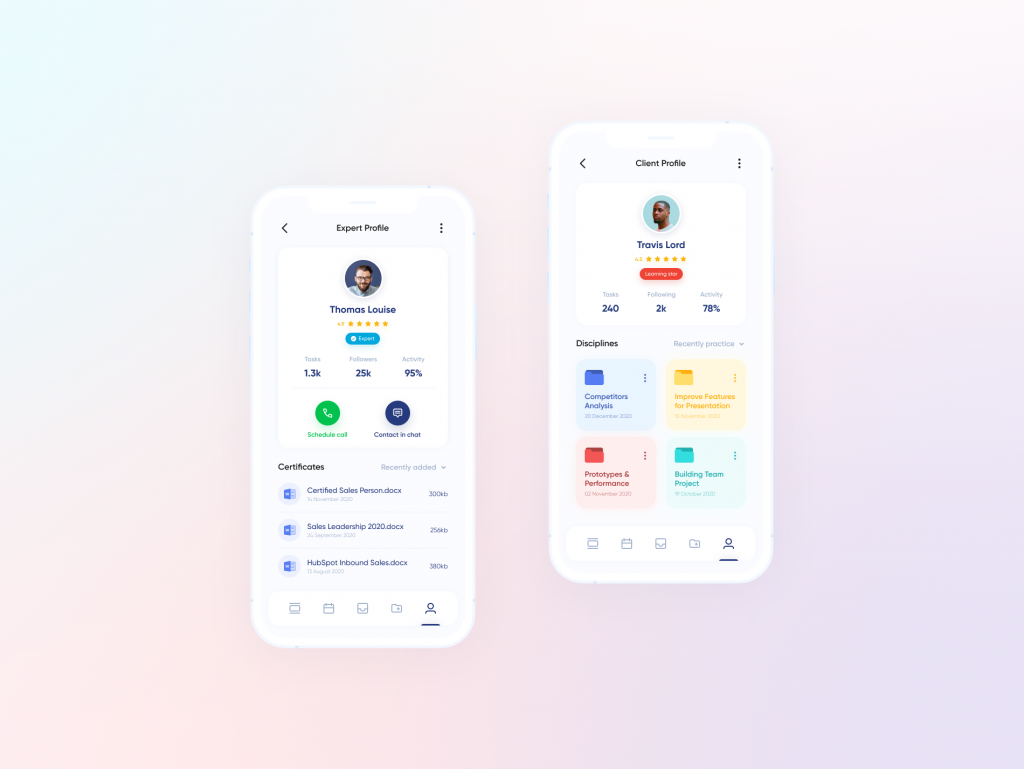
We were able to launch an MVP of our mobile app in just five weeks and iteratively improve it thereafter.
When choosing our MVP development service, you focus on launching a product with only the essential features. This significantly reduces development time and costs. And because you’re getting the product out there quickly, you’re able to get feedback from users and see what features they actually need and want. This helps you avoid adding features that are unnecessary and simply add to the development costs.

Content management
To facilitate on-platform content administration, we implemented fundamental CMS features.
The ability to construct, administer, and distribute all types of tests, as well as add the articles or upload any supplemental materials, such as scientific works, manuals, and source materials, is a valuable tool for experts.
For students, this means being able to download and view files sent by subject matter experts and taking exams without ever having to leave the site.
Gamification
Gamification components assist both learners and specialists to remain motivated and boost platform loyalty. It was not our primary objective to gamify the platform, but minor game mechanics details relieve user stress and make them laugh:
- Funny badges and levels for experts and learners;
- Incentives for a good job;
- Personalization allows users to express themselves.
Jellyfish.tech’s online education marketplace was ahead of its time when it was first developed, but the pandemic only served to increase the platform’s popularity.
Since our software is built on a modular framework, we can easily implement new features in response to user feedback and industry developments. It’s possible to use this model in any area.
This endeavor demonstrates that education need not be complicated, that an e-learning program may be user-friendly, and that students can easily interact with subject-matter experts.
Signs your organization needs an e-learning platform
E-learning is one of the most cost-effective ways to train your staff. Yet, it can be difficult to manage if you are using more than one platform. If you’re looking to centralize your online learning and make it easier for your team, you need an e-learning development service that allows you to manage all of your courses in one place.
Here are some signs that your organization needs to create an online learning platform:
1. You have a large team that needs training on multiple topics.
When your team is large and needs training on multiple topics, it can be difficult to keep track of which employees have been trained in what areas. You want to make sure that each employee has the knowledge they need to do their job well, but it can be hard to know who’s up-to-date on current trends and best practices — especially when you’re managing a large team.
2. You have multiple departments or divisions within the company that need separate training programs.
This is a common challenge. If you have different departments or divisions within your company that need separate training programs, then it’s important to keep in mind that the design of these programs should reflect the unique needs of each group.
For example, if you have a sales team and an operations team within your company, it might make sense for the sales team to receive training on how to conduct cold calls and close deals while the operations team is learning about inventory management. This way, both groups can get what they need from their training program without having to worry about competing with one another for resources or attention from their manager.
3. Your currently available full-time training options cannot meet demand.
As your company grows, your training needs will change. In many cases, the current full-time training options available to you will not meet demand. An e-learning platform can provide a more flexible and cost-effective way to train employees, as well as reduce the number of time workers spend away from their teams and customers.
4. You don’t have a streamlined system in place to oversee company-wide training sessions.
Not having a streamlined system to oversee company-wide training sessions means that you are missing out on an enormous opportunity to engage your employees and improve their performance. Therefore, to enhance the way your team works together and make sure they are all on the same page, you need to implement an e-learning platform.
5. Constantly evolving methods and tools at work that necessitate prompt dissemination to staff.
When your organization is constantly evolving, it is a must to keep pace with new methods and tools. This means that staff needs to be trained on new information as soon as it is available. An e-learning software allows disseminating the new information quickly, which makes sure that everyone is always up-to-date about what is going on in their work environment.
6. You have budget constraints.
It’s a simple fact: if you have a limited budget, you’re going to want to use it wisely. And that means finding ways to cut costs on things that aren’t essential, like high-cost training programs or expensive equipment. An online learning platform is a great way to do that — it can save your company money by cutting out the cost of travel, accommodations, and other expenses associated with traditional training methods.
Online educational platforms also provide flexibility, letting companies train employees at times when they’re most likely to be available, rather than forcing them into a set schedule that does not work for everyone’s schedule. This lets employees take time off when they need it without making their employer pay more money for them being away from work.
Challenges in the development of e-learning platform
There are many challenges that come with building an online educational platform. For one, it is important to have a robust and user-friendly website that can handle a large volume of traffic. Additionally, the platform must be able to support a variety of different media types (e.g. videos, images, text), and be accessible on a variety of devices (e.g. computers, tablets, smartphones).
Another challenge is ensuring that the content on the platform is of high quality and engaging for users. This can be a challenge because it is often difficult to find quality content that is also appropriate for a wide range of users. Additionally, the content must be updated regularly to keep users coming back to the platform.
Finally, it is important to consider the cost of building and maintaining an online learning platform. This can be a significant challenge, especially for start-ups and small businesses. There are a number of ways to offset the cost of building an online educational platform, but it is important to consider all of the options before making a decision.
Cost of e-learning development
The cost of online learning platform development is not just the cost of developing the product itself, but also the cost of developing a strategy that will grow your business. The more you invest in e-learning, the more you can expect to see an increase in profits. This is because online learning helps your employees become more efficient at their jobs and helps them learn new skills.
The cost of developing an e-learning platform can vary depending on a number of factors, including the size and complexity of the platform, the features and functionality required, and the team of developers working on the project. Generally speaking, the cost of developing an online learning solution can range from a few thousand dollars to tens of thousands of dollars.
Finally, the cost of developing an e-learning platform can also vary depending on the specific needs of the client. For example, a company that requires a very custom and specific platform will likely pay more for development than an enterprise that is looking for a more basic platform.
Conclusion: leveraging e-learning development services
Clearly, e-learning is not a fad, but rather a contemporary method for organizing the educational process. Future interest in this form of education will continue to grow, and the advancement of digital technologies will spur the introduction of new tools. People desire to acquire knowledge rapidly and engagingly, at a convenient location and on their timetable.
Creating online training materials is a very time-consuming task. In order to reduce the time spent on such tasks, it is a good idea to outsource this job to a team of e-learning development experts.
As an e-learning development company, Jellyfish.tech has a team of experts who have the required knowledge and experience to build interactive online training courses for your business. They have access to advanced online course-building tools and can also create unique online educational content for your business. Our e-learning development services can help your business increase its ROI on training and meet your training needs in an affordable, time-efficient manner.

👉👉👉 Contact us to get a consultation on your future online learning platform 🚀

